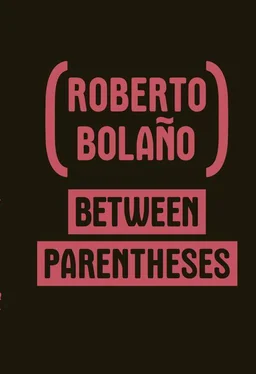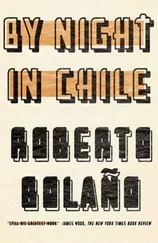Roberto Bolaño - Between Parentheses - Essays, Articles and Speeches, 1998-2003
Здесь есть возможность читать онлайн «Roberto Bolaño - Between Parentheses - Essays, Articles and Speeches, 1998-2003» весь текст электронной книги совершенно бесплатно (целиком полную версию без сокращений). В некоторых случаях можно слушать аудио, скачать через торрент в формате fb2 и присутствует краткое содержание. Год выпуска: 2011, Издательство: New Directions, Жанр: Публицистика, Критика, на английском языке. Описание произведения, (предисловие) а так же отзывы посетителей доступны на портале библиотеки ЛибКат.
- Название:Between Parentheses: Essays, Articles and Speeches, 1998-2003
- Автор:
- Издательство:New Directions
- Жанр:
- Год:2011
- ISBN:нет данных
- Рейтинг книги:4 / 5. Голосов: 1
-
Избранное:Добавить в избранное
- Отзывы:
-
Ваша оценка:
- 80
- 1
- 2
- 3
- 4
- 5
Between Parentheses: Essays, Articles and Speeches, 1998-2003: краткое содержание, описание и аннотация
Предлагаем к чтению аннотацию, описание, краткое содержание или предисловие (зависит от того, что написал сам автор книги «Between Parentheses: Essays, Articles and Speeches, 1998-2003»). Если вы не нашли необходимую информацию о книге — напишите в комментариях, мы постараемся отыскать её.
The Savage Detectives
Between Parenthese
Between Parentheses: Essays, Articles and Speeches, 1998-2003 — читать онлайн бесплатно полную книгу (весь текст) целиком
Ниже представлен текст книги, разбитый по страницам. Система сохранения места последней прочитанной страницы, позволяет с удобством читать онлайн бесплатно книгу «Between Parentheses: Essays, Articles and Speeches, 1998-2003», без необходимости каждый раз заново искать на чём Вы остановились. Поставьте закладку, и сможете в любой момент перейти на страницу, на которой закончили чтение.
Интервал:
Закладка:
In some photographs there seems to be no air. The atmospheric pressure is fierce. People move like sleepwalkers, hearts and lungs each going their own way, unbound. In some photographs I can imagine the young Chilean photographer in a polychromed aluminum wheelchair, navigating the streets of a dream that resembles a city called London but is less a city then an array of speeds. I can imagine Larraín, his face covered in tiny scars as if he had cut himself that morning shaving or as if he didn’t know how to shave. In some photographs it’s Larraín who seems to be inside a fishbowl photographing a vast and vaguely familiar planet.
This is off the subject, but when I was a boy and even an adolescent, people said that Chile was the England of South America (in the same way that Uruguay was the Switzerland, Buenos Aires, Chicago, etc.). Those who claimed this, of course, were Chilean. After 1973 the joke stopped being funny, or became what it had always been: sarcastic. But comparisons are never innocent and after a while they return or their ghosts return: in new trappings, with new frills, with new meaning. They return as doubts. They return as answers. In October 1998 the smug joke of our adolescence, that tedious joke, turned up again. Now England, in its leisure moments, dresses up as Chile and in those images of England, in that English hospitality, we Chileans seek our perfect adolescence (our laughter, in other words, and our carefree existence), but we find nothing. Or maybe we do find something: ugly shadows that belong to us, impossible images from the late 1950s or the mid-1960s, when we could still see things in a different way.
Larraín photographs a parked car and it seems to be going more than sixty miles an hour.
Larraín photographs deserted streets and those streets seem to be emerging from being or nothingness, noiselessly, as if in outer space.
The speeding parked car and the silent streets are simply metaphors of our own loneliness, a loneliness in motion. The mirror of our efforts and our endurance.
Larraín photographs the legs, the shoes, of a woman and a man. They’ve stopped, they’re waiting, but the observer knows they’ll keep walking, move apart, come together, move apart again in a series of irretrievable instants that eventually we’ll call life, chance, nothingness.
One could say that in London the young Larraín found not a city but a universe.
5. The Brave Librarian
Our Guide to the Abyss
All American novelists, including those who write in Spanish, at some point get a glimpse of two books looming on the horizon. These books represent two paths, two structures, and above all two plots. Even sometimes: two fates. One is Moby-Dick and the other is the Adventures of Huckleberry Finn .
The first is the key to those realms that by convention or for the sake of convenience we call the realms of evil, those places where man struggles with himself and with the unknown and is generally defeated in the end; the second is the key to adventure and happiness, a lesser-known land, modest and unassuming, in which the character or characters set the quotidian in motion, start it rolling, and the results are unpredictable and at the same time recognizable and close at hand.
We know that not just anyone can be Ishmael and only one in fifty million can be Captain Ahab. We know it and it doesn’t trouble us, although if we think about it, it should. But we delegate. Huckleberry Finn, however, could be anyone, and though that should make him more lovable, if possible, it fills us with the kind of horror that strikes when we remember passages from our adolescence, an adolescence — Huck’s and our own — full of strength, of curiosity, of ignorance and determination, when lying wasn’t a habit more or less forbidden by some tenuous moral code, but the best way to survive, one way or another, on the Mississippi or on the turbulent and portable river of our inchoate lives, that is of our young lives, when like Huck we were still poor and free.
All American writers drink of these two galloping streams. All of us search these two forests, each looking for his own lost face. Courage, daring, the bliss of he who has nothing to lose or he who has much to lose but whose generosity or madness impels him to risk everything with an elegance that has nothing to do with European elegance (that is, with European perspectives or European literary forms): these are the attributes of men who are now American through and through, an impossiblity, no matter how you look at it, an act of the will, an entelechy that neither Melville nor Twain consciously constructs (at least not the latter), but that is automatically set up by the hunting of the whale from that terrible ship full of men of every stripe, and by that meandering voyage down the Mississippi. Here we have the founding fathers. From Homer to Whitman and from Whitman to the plight of a slave and the madness of a whaling captain. No transition, no method, in the manner of this new and untamed world.
What was Melville trying to tell us? This is an enigma that has yet to be solved because Melville is an enigma and also a writer of greater depth than Twain. What was Twain trying to tell us? Many things, all of them more or less plain: that life is only worth living in adolescence and that adolescence, the territory of immaturity, can extend as far as the freedom of the individual. At first glance it doesn’t seem like much for a founding father. But it’s plenty if the message (which is the message of Thoreau and Rousseau, who was a terrible father) is delivered with energy and humor, and here no one can beat Mark Twain, whose energy, fueled by dialogue and popular turns of phrase, is unique, as is his very black humor.
No one escapes when Twain takes up his pen, when Twain consigns his son Huck to a vagabond life, sending him down the Mississippi River that Twain loved so much in search of freedom for himself and for Jim, a black man who seeks to escape slavery, and the journey of these two characters, along with the voyage of Ishmael on the Pequod , is the quintessence of all trips, an absurd voyage, because instead of traveling upstream or turning at the mouth of the Ohio and heading for the free states, they travel downstream, straight toward the heart of the slave states, and though this would plunge anyone into despair or trigger a nervous breakdown, Huck, who is fleeing his father, and Jim, who is fleeing society, find their lives scarcely disrupted at all as they drift into adventure and meet incredible characters and are shipwrecked and rescued.
Survival. That’s one of the kinds of magic to be found here. The ability to survive. If the novel is read carefully and read at least ten times, some of this magic might come off the page and begin to flow through the veins of the person reading it.
Then there’s the magic of friendship. When Huck, after playing a joke on Jim, discovers with regret that he’s offended him, or when each thinks back on the good things he left behind — Jim: his family; Huck: Tom Sawyer and little else — or when, more commonly, they spend their time lazing around the raft, sleeping or fishing or doing the chores necessary to keeep their craft shipshape, or when they experience moments of danger, what persists in the end is a lesson in friendship, friendship that is also a lesson in the civilization of two totally marginal beings who have only each other and who look after each other without gentle words or tenderness, as outlaws or those outside the bounds of respectability look after each other, because the Adventures of Huckleberry Finn isn’t a novel for respectable people, quite the contrary, which is odd, because the success of Twain’s book among respectable people, who are after all the primary purchasers and consumers of fiction, was huge, and the novel sold (and still sells) in astronomical quantities, which says a lot about the secret urges of respectable or middle-class people, the kind of people we’ll all be someday, as Borges dreamed, and without a doubt was little read in the circles most frequented by Huck, that is among adolescent children of alcoholic and abusive parents, runaways, swindlers and miscreants, or in black American circles, although according to Chester Himes the Adventures of Huckleberry Finn doesn’t fare too badly in the prison libraries of the United States.
Читать дальшеИнтервал:
Закладка:
Похожие книги на «Between Parentheses: Essays, Articles and Speeches, 1998-2003»
Представляем Вашему вниманию похожие книги на «Between Parentheses: Essays, Articles and Speeches, 1998-2003» списком для выбора. Мы отобрали схожую по названию и смыслу литературу в надежде предоставить читателям больше вариантов отыскать новые, интересные, ещё непрочитанные произведения.
Обсуждение, отзывы о книге «Between Parentheses: Essays, Articles and Speeches, 1998-2003» и просто собственные мнения читателей. Оставьте ваши комментарии, напишите, что Вы думаете о произведении, его смысле или главных героях. Укажите что конкретно понравилось, а что нет, и почему Вы так считаете.












